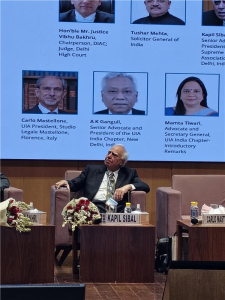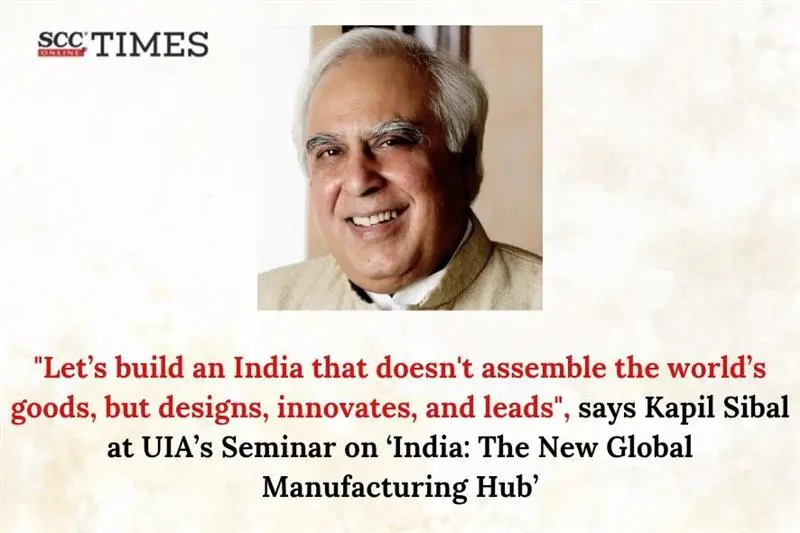The Union Internationale des Avocats (‘UIA’) has organized a two- day seminar on the theme ‘India Ahead: Exploring legal, regulatory and geopolitical updates impacting FDI in the world’s fastest growing economy’. The seminar held at the Delhi International Arbitration Centre (‘DIAC’), Delhi High Court, on 29th and 30th March 2025.
The event was marked by the presence of Mr. Kapil Sibal, who delivered an insightful speech. He addressed the crucial topic of India’s potential as the next global manufacturing hub, outlining the advantages and challenges that the country faces in this pursuit.

Mr. Kapil Sibal, Senior Advocate and President of the Supreme Court Bar Association, shared his thoughts on India’s potential to become the next global manufacturing hub, building upon the ideas presented earlier. He began by addressing the shifting global economic landscape, particularly the rise of unilateralism and bilateralism. He pointed out the significance of these changes for India, emphasizing that with a population of 1.4 billion and the World Economic Forum’s projection of 537 million middle-class Indians by 2030, India had a huge and growing market, which positioned it uniquely for global manufacturing.
He then discussed India’s demographic advantage, noting that half of India’s population was below 25 years old, and the median age was just 28. This, combined with India’s strong domestic demand, made the country an ideal location for manufacturing. Mr. Sibal highlighted India’s remarkable resilience during the COVID-19 pandemic, where the country still grew at 6%, outpacing even China in terms of growth. This resilience was fueled by strong domestic consumption, which was now driving the demand for goods.
He further discussed the case of BYD, a Chinese electric car manufacturer, which had decided to set up a manufacturing plant in Telangana in 2023. BYD recognized that manufacturing in India offered several advantages: lower labor costs, tax benefits, and access to a huge domestic market. This move was a prime example of how India’s competitive advantage in manufacturing could attract global investment.
Mr. Sibal continued by comparing India’s FDI landscape to China’s, noting that India was still receiving significant investment in low-end manufacturing, while China had largely transitioned to high-end manufacturing. He emphasized that India’s growing domestic market for low-end products, alongside an expanding international market, made it an attractive destination for foreign investments in manufacturing.
Another key point Mr. Sibal raised was the innovation and adaptability of India’s workforce, particularly in the tech sector. He noted that India’s ability to combine software development with hardware manufacturing was a unique advantage that could foster the production of cutting-edge products at competitive prices.
However, Mr. Sibal acknowledged some challenges, particularly regarding the environmental impact of increased manufacturing. He pointed out that the growth of electric vehicles and other manufacturing sectors would require more electricity, which might lead to an increased reliance on coal and, consequently, a larger carbon footprint. He stressed that these concerns would need to be addressed through bilateral negotiations, especially with global stakeholders concerned about sustainability.
Turning his attention to international trade, Mr. Sibal highlighted the significance of the Free Trade Agreements (‘FTAs’) India was pursuing with key economic powers, including the United States, the European Union, Australia, and the United Kingdom. These agreements, once finalized, would help India align its economic needs with global markets, further enhancing its position as a global manufacturing hub.
Mr. Sibal concluded by addressing the critical need for skill development in India. He acknowledged the government’s efforts to enhance the skills of India’s workforce but stressed that more work was needed to equip 500 million people with the necessary skills to meet the demands of modern manufacturing industries. He also pointed out the high cost of capital in India, which was another obstacle to competitiveness. He suggested that targeted concessions and reforms would be necessary to lower capital costs and improve the overall manufacturing ecosystem in the country.
Mr. Sibal emphasised that while India had enormous potential to become the next global manufacturing hub, it needed to focus on addressing key challenges in skill development, cost of capital, and infrastructure to realize this potential fully.
Mr. Kapil Sibal, further touched upon the National Manufacturing Pipeline, a crucial initiative in the process of bolstering India’s manufacturing sector. While acknowledging that the pipeline was still in progress and a bit slow, he emphasized the urgency of completing these efforts and removing barriers that hinder economic growth.
He expressed that one of the most significant steps forward would be to eliminate unnecessary hindrances for industries, which would allow for economic activity to flourish without unnecessary obstacles.
In his concluding remarks, Mr. Sibal outlined the challenges facing India’s manufacturing sector, which include structural inefficiencies and financial constraints. However, he emphasized that with targeted reforms, innovation, and a focus on improving global competitiveness, India had the potential to overcome these challenges and emerge as a global manufacturing powerhouse.
He further stressed the broader implications of strengthening the manufacturing sector, noting that it would not only generate jobs but also enhance India’s strategic and economic position on the global stage. He made a passionate call for reforms that would transform India into a country that does not just assemble goods for the world but leads in design, innovation, and quality.
“Let’s build an India that doesn’t assemble the world’s goods, but designs, innovates, and leads,” he said, reinforcing the idea that India’s future in manufacturing lies not just in production but in uplifting lives, driving sustainable growth, and earning its place in the global manufacturing landscape.







Mr. Sibal delivered an excellent talk. India is poised to touch new heights and keep growing.